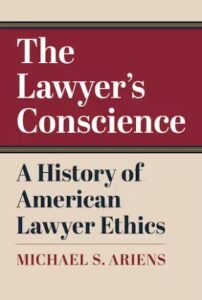Professor Michael Ariens’s New Book as a Teaching Tool
This is the second in a series of three blog posts this week by Marquette law faculty on a new book.
 In The Lawyer’s Conscience: A History of American Lawyer Ethics (University of Kansas Press 2022), Professor Michael Ariens provides a history of lawyer ethics and identifies problems that make it difficult for modern lawyers to live up to the ideals of an ethical lawyer. Conceptions of the ideal lawyer have changed from the late 1700s to the present day, and the book provides historical examples of lawyer ideals at different points in history. Broadly speaking, the historic honorable lawyer was motivated primarily by a sense of duty to conscience and regard for the public good. The honorable lawyer was committed to serve as a professional and did not attach undue importance to matters such as fees or client preference.
In The Lawyer’s Conscience: A History of American Lawyer Ethics (University of Kansas Press 2022), Professor Michael Ariens provides a history of lawyer ethics and identifies problems that make it difficult for modern lawyers to live up to the ideals of an ethical lawyer. Conceptions of the ideal lawyer have changed from the late 1700s to the present day, and the book provides historical examples of lawyer ideals at different points in history. Broadly speaking, the historic honorable lawyer was motivated primarily by a sense of duty to conscience and regard for the public good. The honorable lawyer was committed to serve as a professional and did not attach undue importance to matters such as fees or client preference.
Through classroom discussions in courses such as The Law Governing Lawyers and Professional Identity Formation (and even Legal Writing and Research), I know that students yearn to practice in an age when the public perceived lawyers as esteemed community members safeguarding the public good. The Lawyer’s Conscience has inspired me to bring more historical perspective into these discussions. I want my students to know, for example, that the problem of lawyer misuse of power is not new and not reserved for the modern age, even if modern developments have introduced new and different problems. For a very long time, lawyers have had to embody conflicting roles, serving as advocate and counselor but also as an officer of the court and legal system reformer.


